GOP
Rand Paul has used the last few months to aggressively court evangelicals through a CBN special, a trip to Israel, and appearances with pastors. This is a shift to take Paul from a tea-party hero to a mainstream political player. Paul refers to himself as a "“libertarian Republican” to distant himself from his father's strong libertarian beliefs. The Washington Post reports:
As he openly considers a run for president in 2016, Paul’s rebranding effort is a test of his political skills as well as the state of the Republican Party. For the senator, the question is whether he can win over the establishment without upsetting his tea party base.
Read more here.
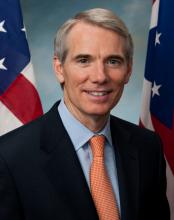
Republican U.S. Sen. Rob Portman on Thursday announced he has reversed his longtime opposition to same-sex marriage after reconsidering the issue because his 21-year-old son, Will, is gay.
“It allowed me to think of this issue from a new perspective, and that’s of a Dad who loves his son a lot and wants him to have the same opportunities that his brother and sister would have — to have a relationship like Jane and I have had for over 26 years,” Portman told reporters in an interview at his office. Portman said his son, a junior at Yale University, told his wife, Jane, and him that he’s gay and “it was not a choice, it was who he is and that he had been that way since he could remember.”
The conversation the Portmans had with their son two years ago led him to evolve on the issue after he consulted clergy members, friends — including former Vice President Dick Cheney, whose daughter is gay — and the Bible.
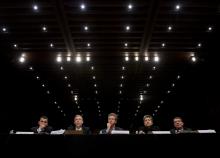
The sequester battle is a good but tragic example of how the idea of the common good is failing in American politics. By contrast, the growing bipartisan support for comprehensive immigration reform is an alternative example of how a moral issue can rise about our ideologically driven politics.
The faith community has stepped into both issues with a call for political leaders to serve the common good. On immigration, political leaders are listening to the faith leaders; on the debates about our nation’s fiscal soul, political leaders need to listen better.

When I stepped back and really thought about what I was experiencing on election night, I started thinking about the night of April 4, 1968, just hours after Martin Luther King, Jr. was assassinated. Having not yet been born, I thought about the coverage of it that I’ve seen. About how Robert Kennedy found himself in front of a crowd of supporters for a presidential campaign rally in Indianapolis. Many there that night were black and hadn’t heard the news of King’s death. As he did with most difficult topics, Kennedy laid it all out there. The crowd gasped and screamed and cried. Kennedy said he understood the anger and hate each of the men and women there that night would probably feel. After all, a white man had also killed his brother.
“What we need in the United States is not division,” Kennedy told the crowd. “What we need in the United States is not hatred. What we need in the United States is not violence and lawlessness, but is love and wisdom and compassion toward one another. A feeling of justice toward those who still suffer within our country.”

The Billy Graham Evangelistic Association removed language labeling Mormonism a “cult” from its website after the famed preacher met with Republican nominee Mitt Romney last week and pledged to help his presidential campaign.
The removal came after a gay rights group reported that the “cult” reference remained online even after Graham all but endorsed Romney, a Mormon, on Oct. 11.
Ken Barun, the BGEA’s chief of staff, confirmed the removal on Tuesday.
“Our primary focus at the Billy Graham Evangelistic Association has always been promoting the Gospel of Jesus Christ,” Barun said in a statement. “We removed the information from the website because we do not wish to participate in a theological debate about something that has become politicized during this campaign.”

What if I told you that the political discourse in America has proven for decades what PSY’s ‘Gangnam Style’ phenomenon has proven recently? What do I mean? It is simply this: people can indeed get tirelessly excited about something that sounds good without understanding its contents.
Like every election year, 2012 seems to have its own particular set of buzzwords and slogans. From “the forgotten 47 percent” to “you did build that,” those on the left and the right are each trying to infuse the political discourse with their own partisan lingo. But it’s time somebody put a stop to the hype and asks the sensible question: “What is the real meaning behind all of this?”
Truth is, both political parties have been directing their resources to highlight their differences more than anything else. They are platforms defined by contrast, not by real facts. This should lead us to raise the question that is usually unasked (and therefore unanswered) amid the consistent heat of the American political climate: “If the government is designed ultimately for the good of the people, is the political discourse today reflective of that goal?”
To this question, the German philosopher Friedrich Nietzsche answers, “No.”

Someone asked me recently what I thought of something “as a member of the Christian Left.” My insides tightened and screeched into a ball. It was as if Freddy Krueger had run his sharpened fingernails across the black board in history class. Christian Left? Left of what? When did I sign that membership card?
Maybe it’s the title of my last book, Left, Right and Christ: Evangelical Faith in Politics, which was co-written with a Tea-Partier who is also an evangelical Christian. The book does frame me as the one on the left, but if you read my chapters you’ll see that is not my mind or my heart.
In times like these, when politicians are sweating to sway voters to their side, or frame their opponents as the polar opposite—the enemy—it is tempting to begin to define ourselves and each other through the frame of politics. We place each other in convenient little political boxes—boxes not made by scripture or the church, but by politicians and the media.

If you blink, you might miss the fact that the religious luminaries offering prayers at the Republican National Convention agree on a surprising topic: the need to welcome immigrants and pass immigration reform.
The views of these religious leaders differ sharply from the Republicans’ own platform. Guided by the likes of Kansas Secretary of State Kris Kobach, the brains behind state-level anti-immigrant laws, the GOP draft platform takes a hardline stance on immigration.
But the Episcopal, evangelical Protestant, Greek Orthodox and Catholic leaders chosen to lead the RNC in prayer beg to differ.

Mitt Romney says in a new interview that one of the reasons he’s distressed about disclosing his tax returns is that everyone sees how much money he and his wife, Ann, have donated to his Mormon church, and that’s a number he wants to keep private.
“Our church doesn’t publish how much people have given,” Romney tells Parade magazine in an edition due out on Aug. 26. “This is done entirely privately. One of the downsides of releasing one’s financial information is that this is now all public, but we had never intended our contributions to be known. It’s a very personal thing between ourselves and our commitment to our God and to our church.”
Romney has released his 2010 tax returns in his White House campaign and, so far, a summary of last year’s tax information. But despite pressure from Republican opponents in the primaries and President Obama’s re-election campaign, Romney has refused to disclose more.
While it may not be a major reason, Romney says disclosing his charitable donations isn’t something he wants to do.
"From a scientific standpoint, what's legitimate and fair to say is that a woman who is raped has the same chances of getting pregnant as a woman who engaged in consensual intercourse during the same time in her menstrual cycle," said Dr. Barbara Levy, vice president for health policy at the American Congress of Obstetricians and Gynecologists.
One widely accepted study suggests a 5 percent pregnancy rate following rape, resulting in 32,000 pregnancies each year.
The report was from the Medical University of South Carolina and was published in the American Journal of Obstetrics and Gynecology and cited by the U.S. Centers for Disease Control and Prevention.
But placing an exact figure on post-rape pregnancy is problematic, primarily because rape is thought to be underreported. Another factor is the availability of over-the-counter emergency contraception, which can prevent fertilization when taken after intercourse.
One study from the journal Human Nature in 2003 suggests pregnancy rates are higher after a rape when compared with consensual sex because of the inconsistency of birth control use.
Over the weekend, Salon published an excerpt from Mike Lofgren's new book, The Party Is Over:
Having observed politics up close and personal for most of my adult lifetime, I have come to the conclusion that the rise of politicized religious fundamentalism may have been the key ingredient in the transformation of the Republican Party. Politicized religion provides a substrate of beliefs that rationalizes—at least in the minds of its followers—all three of the GOP’s main tenets: wealth worship, war worship, and the permanent culture war.
Religious cranks ceased to be a minor public nuisance in this country beginning in the 1970s and grew into a major element of the Republican rank and file. Pat Robertson’s strong showing in the 1988 Iowa presidential caucus signaled the gradual merger of politics and religion in the party. Unfortunately, at the time I mostly underestimated the implications of what I was seeing. It did strike me as oddly humorous that a fundamentalist staff member in my congressional office was going to take time off to convert the heathen in Greece, a country that had been overwhelmingly Christian for almost two thousand years. I recall another point, in the early 1990s, when a different fundamentalist GOP staffer said that dinosaur fossils were a hoax. As a mere legislative mechanic toiling away in what I held to be a civil rather than ecclesiastical calling, I did not yet see that ideological impulses far different from mine were poised to capture the party of Lincoln.
Read more of the excerpt here

Michael Goldstein voted for Barack Obama in 2008 and supports gay marriage and an assault weapons ban. Before moving to New Jersey 11 years ago to raise a family, the Brooklyn native fit right in with other lifelong Democrats in Manhattan’s Upper West Side.
But Goldstein now says he has buyer’s remorse. And last week the 48-year-old East Brunswick man became the face and voice of a national campaign aimed at converting fellow Jews who voted for Obama four years ago into supporters of Republican Mitt Romney.
In a video on the Republican Jewish Coalition website, Goldstein talks about his disappointment in Obama’s handling of the economy and U.S. relations with Israel.
“I was a big Obama supporter. I really believed in him and believed in what he stood for,” Goldstein says in the video. But, he continues, “when he gave the speech about the ’67 borders, it was nothing that had come up in his campaign originally. That really changed my mind about him.”
Scott Keys reports for ThinkProgress:
"One of the most conservative congressmen in the country stepped up to defend Huma Abedin, a top aide to Secretary of State Hilary Clinton, and the rights of all Muslim-Americans yesterday against Rep. Michele Bachmann’s (R-MN) spurious accusations that she is affiliated with the Muslim Brotherhood, calling them 'the wrong thing to do.'”
During a town hall held by Rep. Jim Sensenbrenner (R-WI) on Sunday, a constituent lauded Bachmann’s anti-Muslim witchhunt about a supposed Muslim Brotherhood infiltration of the U.S. government and called on her congressman to support her efforts. Sensenbrenner instead used the opportunity not only to defend Abedin, but to advocate for the larger notion of religious pluralism in America and a separation between church and state."
Read more about Rep. Sensenbrenner's response here
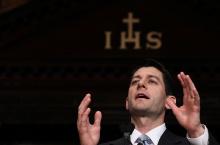
Give Congressman Paul Ryan credit for persistence.
The Wisconsin Republican and architect of the GOP’s budget plan has spent a month arguing that his party’s proposals to cut programs for the needy while sparing the Defense Department and not raising taxes on the wealthy are in line with the social justice teaching of his own Catholic Church.
And for just as long, Catholic groups and theologians -- and even the Catholic bishops -- have been saying that in fact the GOP plan fails to meet the basic “moral criteria” of Catholic teaching.
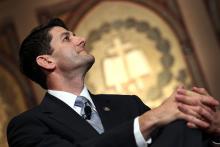
Speaking at Georgetown University, Rep. Paul Ryan—the chairman of the House Budget Committee and a possible vice-presidential candidate— seemed to seek to quell the debate. He called his budget a roadmap to avoid a debt crisis that will hurt the poor hardest of all.
And he seemed to soft peddle his defense of the document as consistent with Catholic teaching.
“The work I do as a Catholic holding office conforms to the social doctrine as best I can make of it. What I have to say about the social doctrine of the Church is from the viewpoint of a Catholic in politics applying my understanding to the problems of the day,” he told an audience composed mostly of students, faculty and staff.
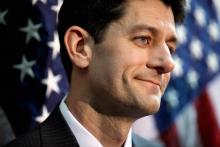
A week after House Budget Committee Chairman Paul Ryan claimed his Catholic faith inspired the Republicans' cost-cutting budget plan, the nation’s Catholic bishops reiterated their demand that the federal budget protect the poor, and said the GOP measure “fails to meet these moral criteria.”
That and other strongly-worded judgments on the GOP budget proposal flew in a flurry of letters from leading bishops to the chairmen of key congressional committee.
The letters to Capitol Hill were highlighted in a Tuesday (April 17) statement from the U.S. Conference of Catholic Bishops that came after Ryan, a Wisconsin Republican and rising conservative hero, told an interviewer last week (April 10) that his fiscal views were informed by Catholic social teaching.
Most of the first punditry around Rick Santorum suspending his quest for the Republican presidential nomination focuses on his drop in the Pennsylvania opinion polls and his difficulty in fundraising. Those were no doubt part of the decision. But there’s a deeper reason more important than political considerations.
As has been frequently reported, Sen. Santorum and his wife Karen’s youngest child Bella, was born with a rare and usually fatal chromosomal condition known as Trisomy 18. Bella, 3-years old, has been hospitalized twice already this year with pneumonia, most recently this past weekend. Santorum took two days from campaigning to be with her.
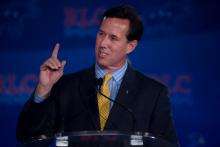
Rick Santorum, candidate for the Republican Presidential nomination, has ended his run for the GOP presidential nomination, he announced at a news conference from a hotel in Gettysburg, Pa., today (Tuesday).
Despite winning primary contests in 11 states, failure to win any of the three primaries last week in Wisconsin, Maryland and the District of Columbia heaped pressure on Santorum’s campaign.
Sen. Santorum, accompanied at the podium by his wife and several other family members, explained to journalists gathered at today’s press conference that the recent hospitalization of his young daughter Bella, who has a rare genetic disorder, had impacted his decision to end his campaign.
In a lunchtime speech today before hundreds of reporters and editors attending the annual meeting of the Associated Press, President Obama launched an attack on the House Republican budget passed last week.
“Disguised as a deficit reduction plan, it’s really an attempt to impose a radical vision on our country. It’s nothing but thinly veiled social Darwinism,” Mr. Obama said. “By gutting the very things we need to grow an economy that’s built to last — education and training, research and development — it’s a prescription for decline.”
The House budget would do the reverse of what the country needs. It cuts taxes on the wealthiest, increases military spending, and drastically reduces domestic programs, especially those serving the neediest. As the Center on Budget and Policy Priorities said, “It would likely produce the largest redistribution of income from the bottom to the top in modern U.S. history and likely increase poverty and inequality more than any other budget in recent times (and possibly in the nation's history)."
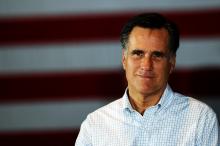
The Mitt Romney whom many Americans see today is often depicted as wealthy, wooden and out of touch with the working class. To some, he seems gaffe prone, detached, even distant.
But that's not the man Boston Mormons knew in the late 1980s and early '90s, when many saw him as an eloquent speaker, a compassionate counselor and a creative problem-solver, generous with his money and quick to help any in need.
Are the two guys related?